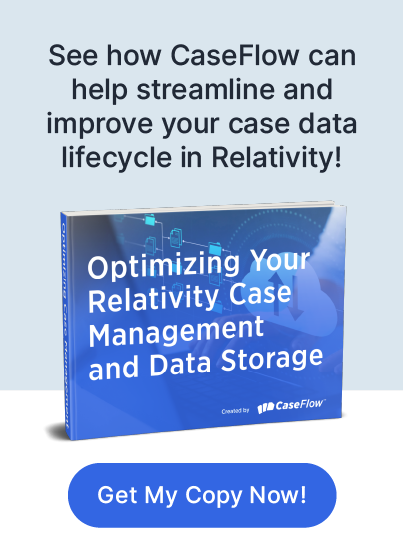Optimizing Relativity Storage Costs: A Practical Guide

If you’ve worked with Relativity, you’re probably familiar with the different data lifecycles. If you're not actively managing your data, storage costs can snowball quietly and fast. It's crucial to consider why and where you generate the most costs and how to manage them.
Relativity is a powerful e-discovery platform, so law firms rely on it for everything from early case assessment to trial prep. However, power and scale come with the tradeoff of massive amounts of data and ongoing storage costs. Most firms don't realize how much they're overspending until it’s too late.
But this guide isn’t going to keep telling you what you already know; it’s going to help you do something about it. Read on to learn why these costs creep up, what you can do to manage them more intelligently, and how to build a system that doesn't just fix the problem once—it also keeps it from coming back.
What’s Actually Behind Relativity Storage Costs?
The core issue is that you’re storing more than you need for longer than you should, in ways that cost more than they have to—and most of that is preventable.
Relativity splits its storage into three main types: structured data (things like metadata or coding fields), unstructured data (your native files, docs, emails, and audio), and SQL-based data (system and workspace info). In cloud deployments like RelativityOne, all that gets billed monthly, typically by the gigabyte. That’s fine in theory, but in practice, most litigation teams don’t have a reliable process for managing what goes in and what stays there long after it's useful.
Consider this: How many inactive workspaces are still sitting in production right now? How many TIFF images were generated automatically when no one actually needed them? What about the audit logs that haven’t been touched in years, the ones that are still being stored “just in case”?
If a workspace isn’t archived or deleted, it stays live. If you're not reviewing data retention policies regularly, you’re burning the budget on cold data that no one uses.
The good news is that this is fixable. You just have to stop treating storage like an afterthought.
Why Litigation Teams Struggle
There’s no one reason that storage costs get out of hand. Usually, it's death by a thousand cuts. Sometimes it's operational inertia. A Matter closes but nobody touches the workspace. Someone duplicates data during ingestion because no one’s sure if the previous upload was complete. The team decides to image every doc for consistency, despite 60% of them never being reviewed.
For many firms, nobody “owns” the responsibility of checking these things regularly. IT thinks that legal should handle it, and legal thinks that IT is monitoring it. Everyone’s just trying to keep cases moving.
But litigation data isn’t merely an asset; it’s a liability. If you're not making conscious decisions about how to store and manage it, it will cost you, not only in dollars but also in performance, review speed, and overall control.
CaseFlow, a Relativity-approved application built by NSerio, was developed for precisely this reason. It automates data lifecycle management in Relativity, flagging workspaces for review, automating archive triggers, and helping teams spot where excess data is hiding. In short, it does the work that no one has time for and ensures that nothing falls through the cracks.
You Can't Cut Costs If You Don't Set Limits
One of the most overlooked strategies in managing Relativity storage costs is simply setting limits: Define a maximum workspace size. Cap data retention unless someone requests an exception. Create an auto-archive rule for workspaces older than six months.
When built into policy, these small decisions prevent reactive cleanup later.
You also need to train the people who are touching the data. If case teams don’t know how their upload habits or imaging decisions affect storage bills, they’re not going to change them. That’s not their fault, though; it’s a systems problem. So, hold a thirty-minute training session once a quarter. Walk through the costs, the behaviors that drive them, and the tools that exist to prevent waste. Make it a standard part of onboarding for new litigation support hires. Once teams know how their choices affect budgets, they’ll start making better ones.
If you’re not reviewing this data regularly, you’re flying blind. Schedule recurring check-ins—monthly or quarterly—with whoever’s managing IT and legal ops. Use reporting data to spot cost spikes early and prevent bigger issues later.
Why Law Firms Struggle with Storage Costs and Why They Need a Solution Like CaseFlow
Most law firms using Relativity didn’t set out to let storage costs spiral out of control. It happens gradually, as the demands of litigation outpace internal processes. Over time, what used to be manageable becomes a backlog of data and workspaces and of decisions deferred. It’s where the pain points usually begin.
Data Volume Keeps Growing
Every new Matter adds more data. Every collection brings in more custodians, email, and file types. It’s not uncommon for firms to upload hundreds of gigabytes just for early case assessment. Multiply that by the number of active (and inactive) cases, and you can see how quickly things stack up.
What’s worse is that most of that data ends up duplicated, re-ingested, or never properly culled in the first place. Without a clear strategy for pre-processing or filtering, firms wind up storing data that they don’t need—sometimes indefinitely.
Data Lifecycle Management Is Patchy or Missing Entirely
Many teams treat storage like a warehouse, meaning that once the data goes in, it just stays there. Closed or dormant Matters remain live in Relativity, taking up the same space and incurring the same costs as active litigation.
Nobody wants to delete potentially useful documents. But when there's no defined policy or workflow for archiving, compressing, or offloading data, inertia takes over. Matters from two or three years ago continue to consume resources simply because no one has had the time (or system) to close them out properly.
This kind of inefficiency leads to three major problems:
- Unused workspaces linger without oversight.
- High-cost storage is used for low-priority data.
- Audit trails and logs accumulate beyond their useful life.
The most frustrating part is that everyone knows that it’s happening. But no one owns the cleanup.
CaseFlow Can Help
This is exactly where CaseFlow fits in. It’s not a one-time fix, though; it’s an ongoing system for helping law firms get ahead of these problems. CaseFlow automates the kinds of tasks that fall through the cracks in that it:
- Identifies inactive or aging Matters.
- Flags workspaces that are over storage limits.
- Applies archive policies based on rules that you set.
- Helps track and predict data trends before they affect your budget.
It’s built to operate inside Relativity, without adding friction to your team’s workflow. You can think of it as guardrails for your data lifecycle, a way to keep things moving forward without letting storage bloat pile up in the background.
If your team is seeing rising Relativity storage costs but isn’t sure where they’re coming from, one or both of these challenges are likely at play. Once you're aware of the pattern, the next step is putting the right system in place to break it.
Don’t Let Storage Costs Be a Passive Problem
The truth is that storage tends to be an invisible problem that feels easy to ignore—until it isn’t. By the time someone notices the spike in billing or degraded performance, the waste has already happened.
Relativity storage costs aren’t software problems; they’re workflow, visibility, and resource problems. However, once you shift your mindset and treat data lifecycle management like an active process, you gain control. That’s what matters.
The tools exist, the strategies are repeatable, and the payoffs are real—not only in lower bills but also in smoother reviews and less chaos for your team.
If you’re ready to move from reaction to prevention, start now. Make it part of your regular process. Let your storage work for your cases, not against your budget.
Ready to take control of your Relativity data lifecycle and eliminate unnecessary costs and wasted time? CaseFlow provides the automation that you need to proactively manage your Relativity storage, seamlessly transitioning cases through Repository, Cold Storage, and Archive based on your specific requirements. Don't let manual processes bog you down; see how CaseFlow can save your law firm time and money. Contact us today, and discover the power of automated Relativity data lifecycle management.



